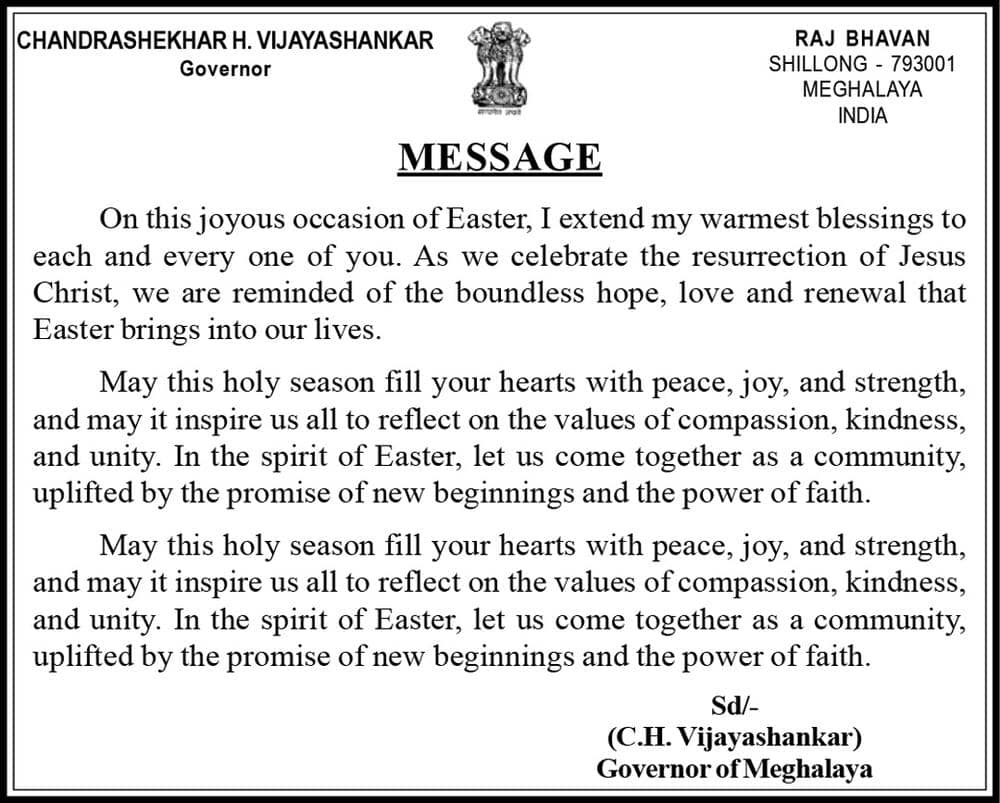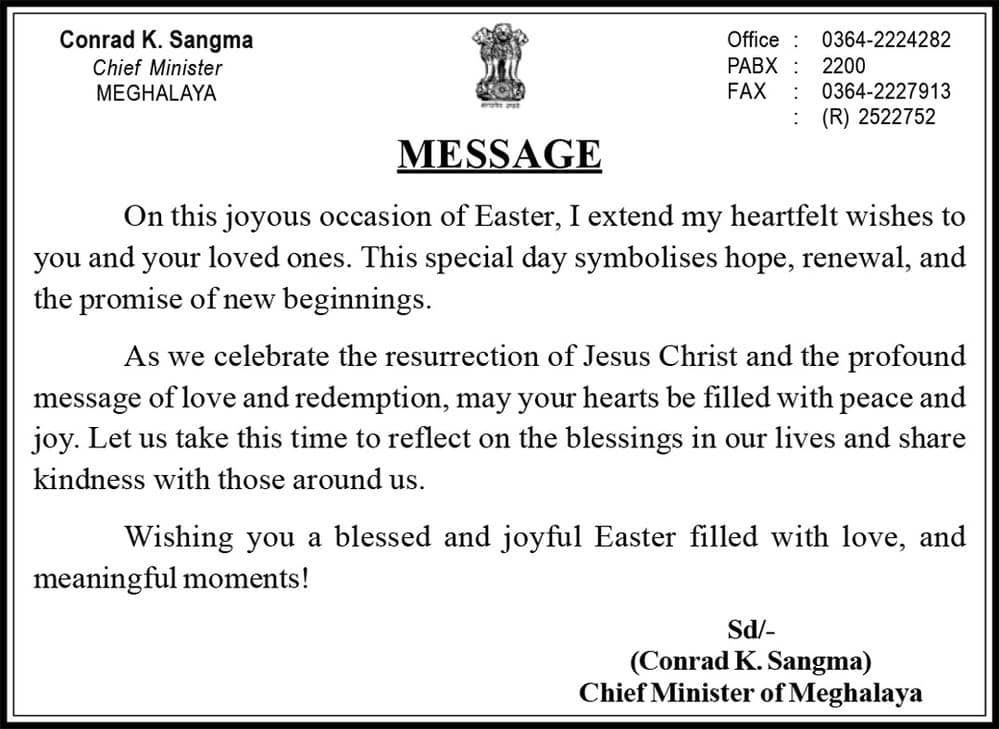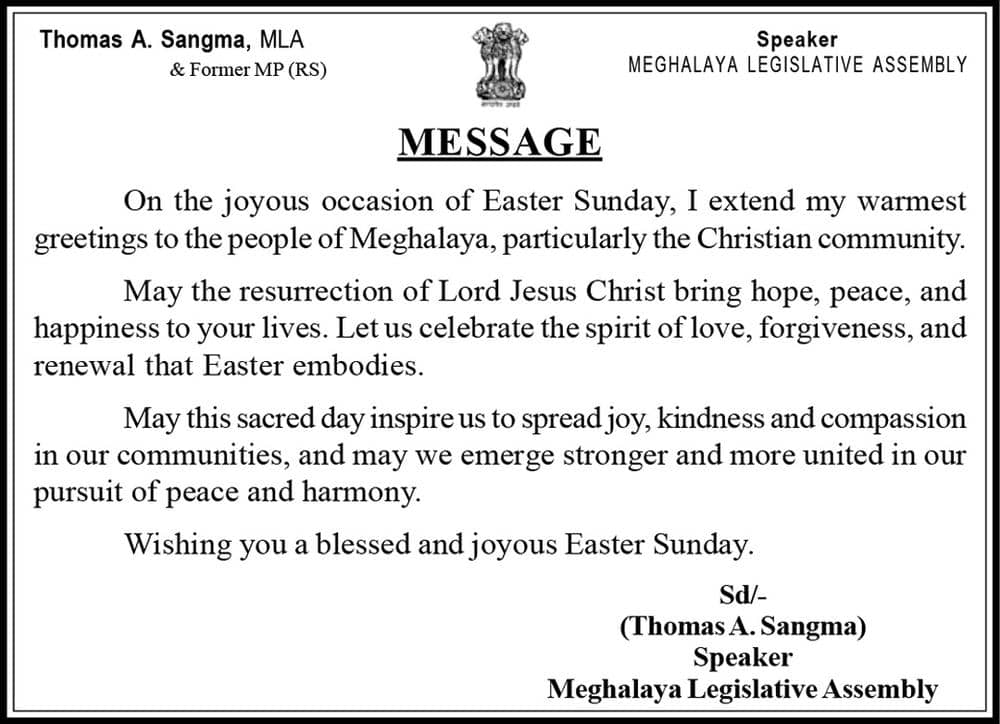Meghalaya’s religious and faith-based leaders to play key role in COVID-19 vaccination

Religious and faith-based leaders across Meghalaya have agreed to play a key role in battling vaccine hesitancy and spread of mis-information against the COVID-19 pandemic. This has come in the aftermath of an interactive zoom session that was held on July 08, 2021 convened by the office of the Principal Secretary, Health & Family Welfare Department. The session witnessed participation from over 150 leaders of various religious organizations from across the State.
Religious leaders and faith-based communities have been playing an important role in sensitizing masses about the COVID-19 virus and the importance and rationale behind COVID-19 appropriate behaviour. And now, as intensive vaccination drives continue, vaccine hesitancy and misinformation, among other factors, have emerged as huge deterrents to preventative care against COVID-19. And with an aim to tackle this, the State Administration organized a one-to-one online interactive session with the religious and faith-based leaders on Thursday.
The session witnessed participation from more than 150 prominent religious & faith-based leaders including Bishop Jose from Tura, Pastor Ruddy Kharkongor, Fr. James Anderson Syiemlieh, Pastor Stephan Pradhan from Ri Bhoi, Rev. HCT Sumer from Jowai, President of ABDK, Tura, Fr. Richard Majaw, Kong Angela Ingty, Rev. S.R Dkhar, KJP Assembly, Pastor Nicky Sangma, Rev. Shanlang Warjri, Rev. Aminot Sohliya and Rev. K. Dkhar from Jowai and Mr. Naba Bhattacharjee, President of the Central Puja Committee, Shillong and Mr. Noor Nongrum from Shillong Muslim Union also participated. The session also saw participation from prominent community leaders including Mr. R.M Blah, General Secretary, Federation of Traditional Village Leaders of Khasi & Jaintia Hills, among others.
The session was convened by Mr. Sampath Kumar, IAS, Principal Secretary, Health in the presence of Deputy Commissioners from several districts and other officials from DHS, NHMMeghalaya and WHO.
The session began with a brief round of interaction and a quick online survey to assess the role of faith-based leaders in fulfilling a shared purpose to battle the pandemic. 70 per cent of faithbased leaders said that they were already taking actions while 30 per cent responded that they were willing to take actions but just did not know how to systematically go about doing the needful. Majority of the religious leaders agreed that religion gives a sense of purpose and meaning during hard times. They also agreed that religion helps to mobilise people and act collectively, and make right moral decisions.
“A harmony of faith, science and tradition is crucial to battle the pandemic situation”, said Naba Bhattacharjee. “It is also crucial to counter false information that has been circulating on social media. People should realise that getting vaccinated is the only solution available as of now to prevent ourselves and our loved ones from getting infected with the COVID-19 virus”.
Religious organizations as information disseminators in rural and hard-to-reach areas
In many hard-to-reach areas of Meghalaya, where people still do not use smartphones and internet, religious places and congregations can act as crucial platforms for information dissemination and addressing concern and queries related to vaccine as well as COVID-19.
“It is evident that the State administration is extensively working through online and offline communication channels to spread information, but many people in rural areas do not even use smartphones, hence, they are often left out of the purview. In such cases, religious organizations like Churches can help to take the right message to the last mile”, remarked Bishop Jose from Tura.
“In rural areas, people are often seen to be psychologically and emotionally affected due to closure of Church services, as these give solace and guidance to them, especially during hard times”, stated Rev. HCT Sumer from Jowai. “The government could come up with guidelines to allow for conducting religious services based on vaccination status. Religious services can be used as platforms for sensitizing people about COVID-19 as well as addressing vaccine hesitancy”.
“Though it may not be wise to open up religious institutions now, given the current scenario, pocket meetings could be held in various religious places where health experts could come in and address a limited number of people and their queries, while following all protocols”, suggested Noor Nongrum from Shillong Muslim Union.
Need for a participatory approach
“With awareness campaigns in local dialects, inclusion of influential villagers, public representatives, community members and religious leaders in busting myths around Covid-19 vaccination and encouraging people to take the jabs, the State Government has been addressing widespread vaccine hesitancy against immunisation”, stated Mr. Sampath Kumar, IAS, Principal Secretary, Health. “But it is not enough and this is not an easy task. Each and every individual must look at themselves as not only part of the problem but most importantly, as part of the solution.”
An important highlight of discussion was the merger of Faith & Science to effectively communicate and sensitise masses. Discussions on the same was initiated through the slide below:

During the course of the session, it was also revealed that many people were of the opinion that vaccination would lead to death or infertility and even minor side effects after the jabs triggered major panic among them. Several queries from participants were addressed by the Principal Secretary as well as the DCs and officials from DHS, NHM-Meghalaya and WHO.
“Public vaccination hesitancy is a matter of great concern and misinformation is the root cause. We have a serious responsibility to lead our people responsibly by removing all misinformation” expressed Mr. R.M Blah, General Secretary, Federation of Traditional Village Leaders of Khasi & Jaintia Hills, among others.
It may be mentioned that in order to increase the acceptance for vaccines among the members of the community, the health department has been roping in influential village personalities, community and religious leaders who have been bridging the communication gap between the government and the people who are still hesitant to take the vaccine. Mass mobilization of government machinery has also been done. Many religious leaders and other influential villagers, along with the MLAs and local MDCs have been taking the jabs first in front of the villagers to prove that they are safe and then asked them to get vaccinated. Several encouraging videos and testimonials are being uploaded in trusted State Government social media handles including- NHM-Meghalaya and DC Office EKH among others social media handles. Several suggestions and important recommendations emerged from the interactive session which the Government will soon take decisions on.
For all information pertaining to COVID-19 and vaccination, one may call toll free helpline no. 14410 or contact their nearest COVID-19 block war rooms.




Leave a Reply